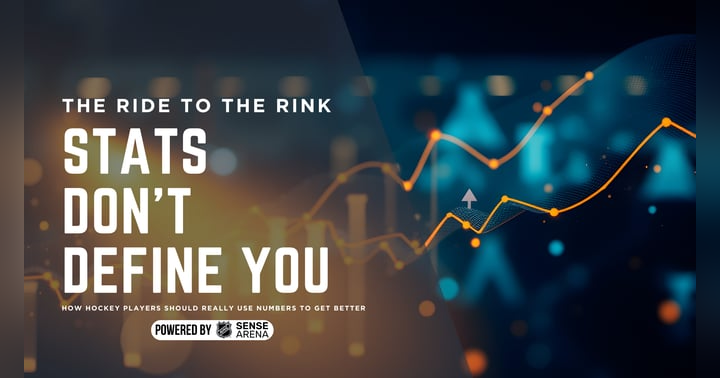A Parent’s Guide to Youth Hockey Development

A Parent’s Guide to Youth Hockey Development – Skater Edition
By Lee Elias & Mike Bonelli
One of the most common questions we get from hockey parents is:
"Is my kid where they’re supposed to be skill-wise?"
We recently broke this down entirely on this episode of Our Kids Play Hockey. But for ease, let’s break it down here together as well.
This guide offers realistic expectations for what your young player should generally be able to do at each age level, along with what they’re working toward next. Every kid is different—and that’s a good thing—but having benchmarks helps parents support their child’s development the right way.
U7 / 6U (Ages 5–6) – “The Fun Zone”
What to Expect:
This level is all about fun, falling, laughing, and learning to love the game. Organized chaos is the name of the game—and that’s exactly how it should be.
Benchmark Skills:
- Standing and balancing on their own
- Marching forward with some glide
- Falling safely and getting back up
- Beginning to glide on one foot
Building Toward:
- Two-foot stops
- Controlled turns
- Confidence moving in all directions
Key Point for Parents:
If your kid is smiling, they’re succeeding. Support them—don’t stress them.
U9 / 8U (Ages 7–8) – “Skating with a Purpose”
What to Expect:
You’ll start to see a bit more control. Players begin to understand that there’s a puck out there to chase and teammates to support.
Benchmark Skills:
- Two-foot stops and starting one-foot stops
- Tight turns and early crossovers
- Puck control while skating slowly
- Short-distance passing and receiving
- Recognizing basic offense and defense roles
Building Toward:
- Understanding positioning during games
- Playing with their head up
- Developing small-area instincts
Key Point for Parents:
Cheer the effort, not perfection. That’s where growth lives.
U11 / 10U (Ages 9–10) – “The Golden Age of Learning”
What to Expect:
This is prime time for skill development. Brains and bodies are syncing up, and kids can absorb a ton.
Benchmark Skills:
- Solid skating stride with edge control
- Wrist and snap shot technique
- Controlling the puck while moving
- Accurate passing under pressure
- Basic offensive/defensive reads
Building Toward:
- Give-and-go plays
- Stickhandling in stride
- Reading the ice and puck movement
Key Point for Parents:
Let coaches coach. Mistakes are part of the process.
U13 / 12U (Ages 11–12) – “Hockey IQ Starts Here”
What to Expect:
This is where the mental side of the game really ramps up. Players start to anticipate and react quicker—and the game moves faster.
Benchmark Skills:
- Supporting the puck and anticipating plays
- Scanning the ice away from the puck
- Backchecking and understanding zones
- Knowing their role within team systems
- Skating transitions (forward ↔ backward)
Building Toward:
- Reading special teams
- Combining skills with strategy
- Game speed decision-making
Key Point for Parents:
Encourage consistency—not comparison. Kids grow on their own timeline.
U15 / 14U (Ages 13–14) – “Strength Meets Strategy”
What to Expect:
Growth spurts and stronger emotions arrive. Systems become essential, and physical play starts to become a real factor.
Benchmark Skills:
- Executing skills at full speed
- Effective zone entries and exits
- Gap control and body positioning
- Playing strong on the puck
Building Toward:
- Game-specific conditioning
- Deeper understanding of PP/PK
- Leading by example
Key Point for Parents:
Off-ice habits (nutrition, training, sleep) matter just as much as practice.
U18 / Junior Hockey (Ages 15–20) – “Prepare to Compete”
What to Expect:
This is the launchpad. Whether it's college, juniors, or just playing at a high level, the habits and mindset here set the tone for life—on and off the ice.
Benchmark Skills:
- Elite edge control and speed
- Advanced puck protection
- Execution under real pressure
- Positional discipline
Building Toward:
- Pre-game mental prep
- Film review and self-assessment
- Long-term athletic planning
Key Point for Parents:
Let the game belong to them. Your job? Keep the joy in it.
Final Thoughts:
This isn’t a checklist—it’s a guide. Every young hockey player develops in their own way. The goal isn’t to rush through levels—it’s to help your child fall in love with the game and build skills at a pace that works for them.
And if you’re ever unsure, ask your coach or tune in to Our Kids Play Hockey. We’re here to help.
Stay supportive. Stay positive. See you at the rink.


